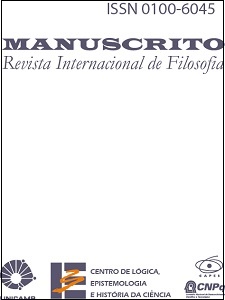Resumen
Current versions of nominalism in the philosophy of mathematics face a significant problem to understand mathematical knowledge. They are unable to characterize mathematical knowledge as knowledge of the objects mathematical theories are taken to be about. Oswaldo Chateaubriand’s insightful reformulation of Platonism (Chateaubriand 2005) avoids this problem by advancing a broader conception of knowledge as justified truth beyond a reasonable doubt, and by introducing a suitable characterization of logical form in which the relevant mathematical facts play an important role in the truth of the corresponding mathematical propositions. In this paper, I contrast Chateaubriand’s proposal with an agnostic form of nominalism that is able to accommodate mathematical knowledge without the commitment to mathematical facts.
Resumo:
Versões atuais do nominalismo em filosofia da matemática enfrentam uma dificuldade na compreensão do conhecimento matemático. São incapazes de caracterizar tal conhecimento como um conhecimento dos objetos descritos pelas teorias matemáticas. A esclarecedora reformulação do platonismo apresentada por Oswaldo Chateaubriand (Chateaubriand 2005) evita esse problema ao propor uma concepção mais ampla de conhecimento como verdade justificada para além de uma dúvida razoável, e ao introduzir uma caracterização adequada de forma lógica segundo a qual fatos matemáticos desempenham um papel importante na verdade das proposições matemáticas correspondentes. Nesse artigo, comparo a proposta de Chateaubriand a uma forma agnóstica de nominalismo que é capaz de acomodar o conhecimento matemático sem o comprometimento com fatos matemáticos.
Palavras chave: Platonismo. Nominalismo. Verdade. Prova. Conhecimento matemático.
Citas
AZZOUNI, J. Deflating Existential Consequence: A Case for Nominalism. New York: Oxford University Press, 2004.
BUENO, O. “Nominalism and Mathematical Intuition”. Protosociology, 25, pp. 89-107, 2008.
CHATEAUBRIAND, O. Logical Forms. Part I: Truth and Descriptions. Campinas: Unicamp, Centro de Lógica, Epistemologia e História da Ciência, 2001. (Coleção CLE, v. 34)
CHATEAUBRIAND, O. Logical Forms. Part II: Logic, Language, and Knowledge. Campinas: Unicamp, Centro de Lógica, Epistemologia e História da Ciência, 2005. (Coleção CLE, v. 42)
DA COSTA, N.C.A., KRAUSE, D., BUENO, O. “Paraconsistent Logics and Paraconsistency”. In: D. Jacquette (ed.) (2007), pp. 791-911.
FIELD, H. Realism, Mathematics and Modality. Oxford: Blackwell, 1989.
HELLMAN, G. Mathematics without Numbers: Towards a ModalStructural Interpretation. Oxford: Clarendon Press, 1989.
JACQUETTE, D. (ed.). Philosophy of Logic. Amsterdam: NorthHolland, 2007.
MCGINN, C. Logical Properties: Identity, Existence, Predication, Necessity, Truth. Oxford: Clarendon Press, 2000.
MELIA, J. “On What There’s Not”. Analysis, 55, pp. 223-229, 1995.
QUINE, W.V. From a Logical Point of View. Cambridge, Mass.: Harvard University Press, 1953.
QUINE, W.V. Word and Object. Cambridge, Mass.: The MIT Press, 1960.
STROUD, B. The Quest for Reality. New York: Oxford University Press, 2000.

